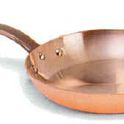I didn't refrigerate my tahini after opening, and that was a few months back. Is it safe to use?
7 Comments
ChefOnoMay 6, 2012
It depends upon what you mean by "safe". It's a matter of degrees (a double pun which I will try to explain herein).
Rancid oil = Free radicals = Bad
The thing is, oil doesn't turn what we deem to be rancid overnight. It slowly oxidizes from the day of manufacture until you sniff it and wonder if it's bad, later being *sure* it's gone bad. Even though your nose doesn't know, the fresher the oil, the fewer the free radicals, the better off you are. Think "sliding scale" from good to really bad with various degrees in between.
All other things being equal (temperature, exposure to oxygen and light), the rate of degradation depends on the percentage of saturated fats in the mix; saturated fats (usually animal) being considerably more stable than most vegetable oils. So outside of the obvious like keeping the lid on and storing it in a dark place, the easiest thing you can do to slow oxidization is to keep it in the refrigerator.
Emily H.May 6, 2012
I don't refrigerate my tahini. Yes, it can go bad but unless it smells weird, it should be fine!
bigpanMay 6, 2012
As long as it has a thin layer of oil covering it, it will be fine.
susan G.May 6, 2012
I've never had tahini go bad, and never refrigerate it. Unlike most nut butters, it seems to be unusually stable. This came up a while ago on Hotline, and there were opposing opinions, though. Refrigerating won't hurt it, so if you feel more comfortable doing that, you can. The oil naturally rises to the top -- just stir it in, getting all the way to the bottom.
davidpdxMay 6, 2012
Like any vegetable oil, it can become rancid. Best test is your nose: if it smells appealingly nutty, it is fine; if it smells sharp and (according to some) "like a crayon" then it is over the hill. I've found that tahini lasts quite a long time before spoiling.
ReineyMay 6, 2012
I never refrigerate tahini. I store it upside-down in my pantry.
lloreenMay 6, 2012
If it smells and looks ok, then I think it is okay. Nut butters can keep a long time and tahini is really just ground sesame seeds.
Showing 7 out of 7 Comments
Recommended by Food52
Popular on Food52
Continue After Advertisement





